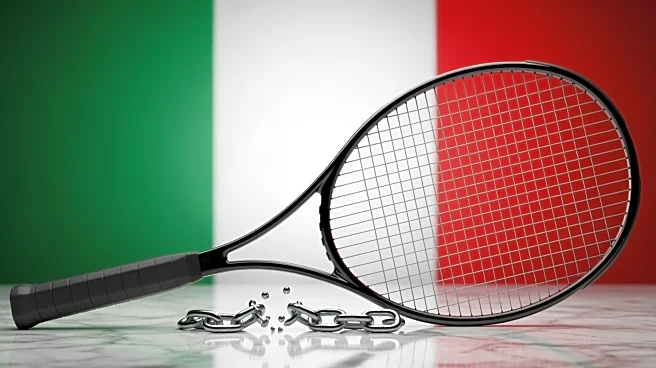What's Happening?
World No. 2 tennis player Jannik Sinner has decided not to participate in the final stage of the 2025 Davis Cup, sparking criticism from the Italian media. Sinner, who is 24 years old, cited his intention
to focus on preparing for the 2026 season as the reason for his withdrawal. The Davis Cup, scheduled to take place in Bologna, Italy, from November 18 to 23, will see the Italian team face Austria in the quarterfinals. Sinner's absence is notable as he has been instrumental in Italy's consecutive Davis Cup victories in previous years. Italy's team captain, Volandri, confirmed Sinner's decision, which has led to widespread media dissatisfaction, particularly from outlets like La Gazzetta dello Sport.
Why It's Important?
Sinner's decision to skip the Davis Cup is significant for several reasons. Firstly, it impacts Italy's chances of securing another victory, given Sinner's pivotal role in past successes. His absence could alter the dynamics of the team and its performance against Austria and potentially other teams. Additionally, this decision highlights the tension between individual career priorities and national team commitments, a common issue in professional sports. The media backlash underscores the expectations placed on athletes to represent their countries, especially in prestigious tournaments like the Davis Cup. This situation may influence how athletes balance personal goals with national duties in the future.
What's Next?
With Sinner opting out, Italy's team will need to strategize differently for the upcoming Davis Cup matches. The team captain and other players will likely have to adjust their approach to compensate for the absence of one of their star players. This could involve reshuffling player positions or altering game strategies to maximize their chances against Austria. The media criticism may also pressure Sinner to reconsider his decision or prompt discussions about athlete commitments to national teams. Furthermore, Sinner's focus on the 2026 season suggests he may prioritize individual tournaments and rankings over team events, potentially influencing his future career trajectory.
Beyond the Headlines
Sinner's decision not only affects Italy's Davis Cup prospects but also raises broader questions about athlete autonomy and the pressures of national representation. It highlights the ongoing debate about the balance between personal career development and national sports obligations. This situation may lead to discussions within the sports community about how athletes can manage these dual responsibilities without compromising their personal goals or national expectations. Additionally, it could prompt a reevaluation of how media and public opinion influence athlete decisions, potentially affecting how future athletes navigate similar situations.









